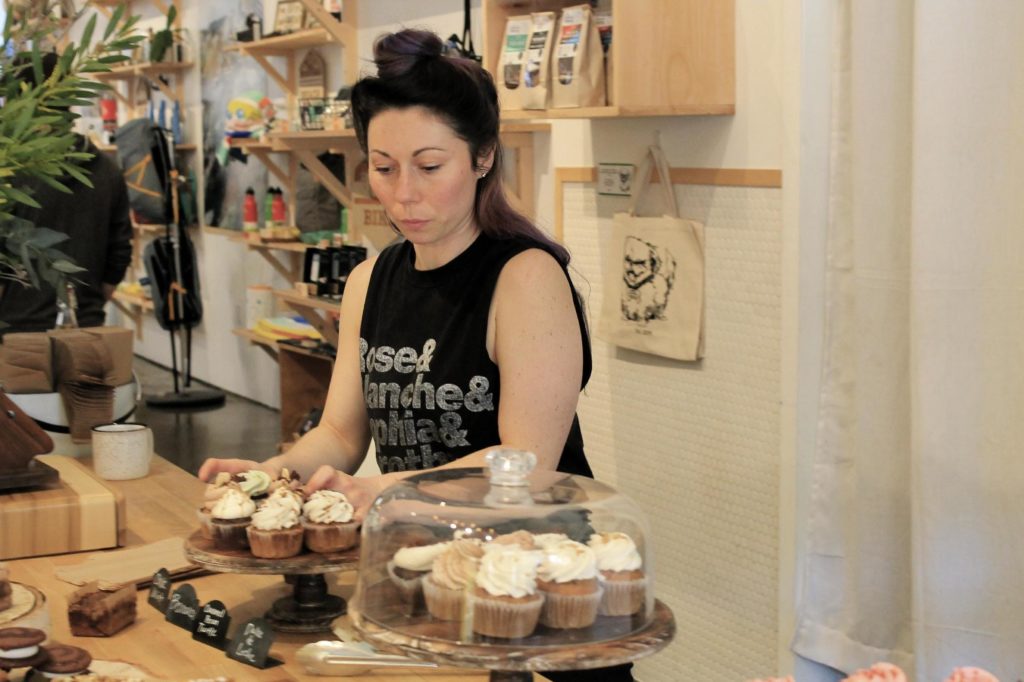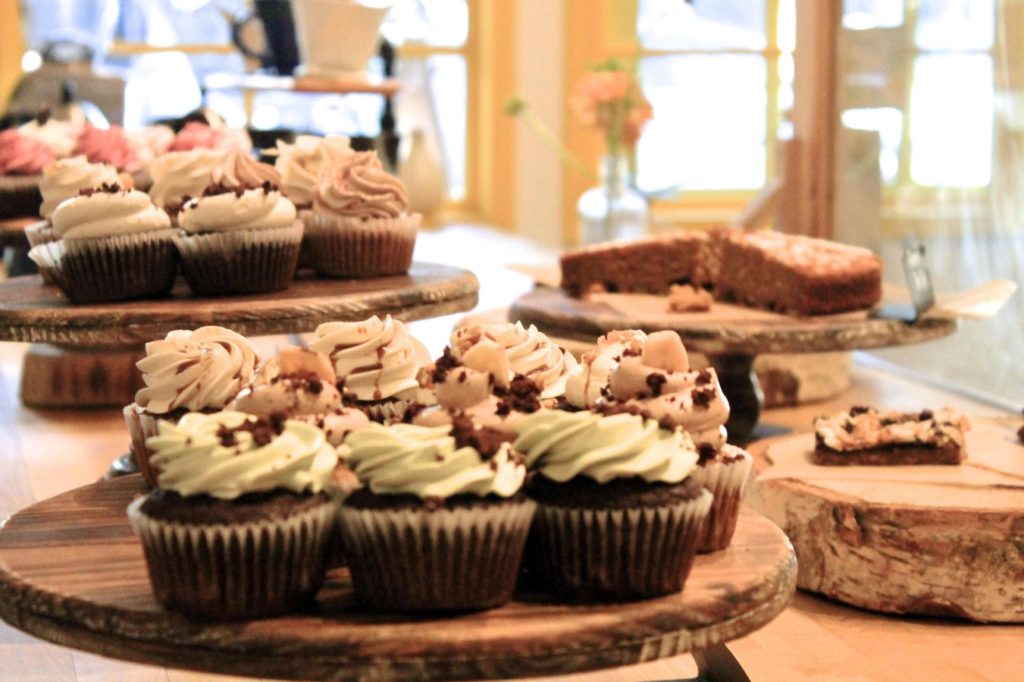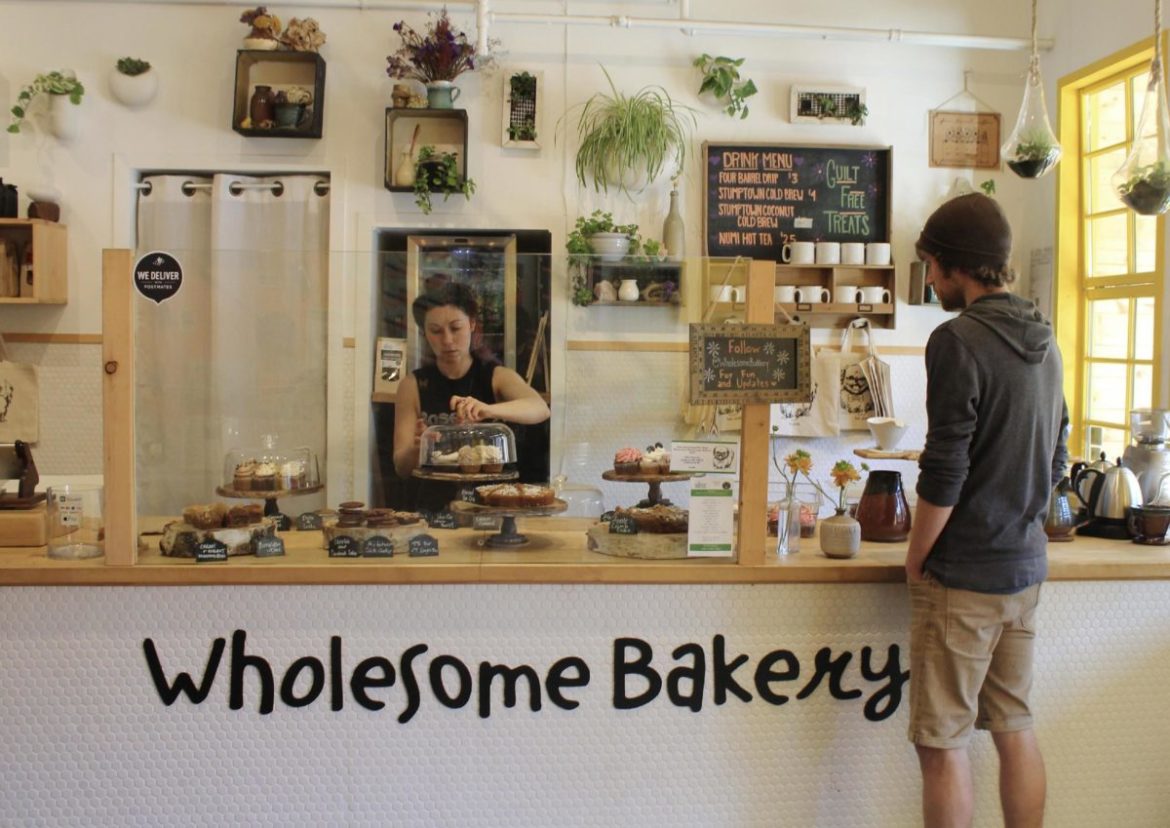Mandy Harper started Wholesome Bakery with an interest in nutrition and sustainability. For starters, Wholesome Bakery caters to those with dietary restrictions and provides everyone with “guilt-free goodies” that are free of gluten, dairy, egg, soy and trans fat. How else is it different from other bakeries? Well, as Mandy says, “You don’t feel like crap after indulging.”

Photo by Priyanka Ramesh
How did you cultivate an interest in nutrition and sustainability?
It all stems back to my brother who became a vegetarian when he was really young…and I followed in pursuit. A few years later he became vegan and so did I. At the time, I didn’t really know what that meant, but as I got older I started looking into why I’m doing this and what it means to me. In my high school days, I was a potato chip vegan. I pretty much had nothing to eat, just a veggie sandwich everyday. However, at a very young age I saw what it meant to not put these things in your body, and I wanted to explore that, and as I got older, I understood it more and what a big impact it can have to just have this awareness. I found some books, like Diet for New America, that taught me a lot, and I realized why I was interested in being vegetarian or vegan. It’s not just about the environmental aspect; I started to realize everything is connected.
What was the final factor that brought your vision to life?
I moved from Arizona to San Francisco to go to school for design, but I never really thought of myself as a designer but rather…a maker. I only went to design school because I wanted to make things. I love that creative process from start to finish, but I realized I was not happy in the fashion design industry. Simultaneously I would make treats for my friends and my boyfriend, and they pushed me to get these in stores. So I was playing around with these recipes and dropped off cookies at two places that called me back and said they wanted to carry my product. I just called it Harper’s Healthy Desserts–trying to figure out the packaging, UPCs and branding was crazy.
What has it been like to break into this challenging industry that began as a niche and is now expanding to cater to a much larger population?
Firstly, the whole thing from start to finish has been me not taking no for an answer. Once the supermarkets decided to pick up the product, I just made this promise and commitment that I could not give up. There were people skeptical about the desserts being vegan, gluten-free and low-glycemic. But it gave me a lot of time to test the market, test my products and perfect them. Secondly, it’s important to play up your strengths. I’m short, silly and I look very young and don’t get taken seriously a lot of the time. But I played that up and that helped me get a lot. Now since I’m more established, I don’t have to do that, they listen. As crazy as it sounds, I forget sometimes that I own a bakery or a cafe because it’s my routine. It’s not for me about notoriety or “I want to be an entrepreneur,” but rather I want to make things and help people and do some social justice in the world.
How did you overcome the challenge of producing “guilt-free desserts” without compromising on taste, and which is your current favorite creation?
Well if you’re using good ingredients, you’re going to produce good products. It can’t not be good; I really think it’s as simple as that. Also, lots of trial and error as I started making things near my house and I would hand out test batches to my friends; some were good and some were bad. Even if you mess up, it’s all a learning experience and I love that. If I had to pick a favorite, definitely the cardamom apple crumb cake is my jam right now. Anything floral, I love it. Anything untraditional, like the lavender cupcake. Every time I eat it, I get more excited.

Photo by Priyanka Ramesh
How would you describe a typical day at work?
Coming in early, we make on a daily basis three to six thousand pieces in a day, which is an amazing feat. We start off pulling out all the bowls and the bakers start coming in and we start prepping everything. I’ve been decorating a bunch of cakes for the most part, but I have someone who’s talented and starting to take that on. Bakers usually start at 2 a.m., but that’s not the life that I want to live. We have our jokes and jam to music. It’s hectic and we work hard, but we have a lot of fun.
What advice would you give to those who are trying to switch to an alternative diet similar to yours in terms of cutting out something as common as dairy or gluten?
There are a lot more options out there, more options than there has ever been. There’s so much out there. Moreover, I love to tell people every time I go to the grocery store, I look for something different. If you’ve never had a papaya, go get a papaya with everything that you get in you basket normally. We’re creatures of habit because it’s comfortable. Try something different, and it’ll brighten your day and open your eyes to what’s out there. You don’t need dairy, and you don’t need soy but if they are a part of your life then that’s okay too. My biggest thing is awareness, just how much you consume and where it comes from. I would say, keep trying new products and don’t feel limited.
What is your take on mindful consumption?
It’s an amazing time because it’s starting to become a common household thing to really think about these thing: what your carbon footprint means, how much you are driving your car, where your bananas are coming from, whether or not your cup of coffee is a product of fair trade. I think it begins in the outer states and starts to trickle in, and I’m excited for it to become more common in this country. It’s unfortunate that so far it’s been about bigger, stronger, faster and make as much money as possible, but people are falling sick from consumption, and I think it just goes back to being aware and striking a balance.
What are your views on the market for alternative eating/mindful consumption in the Bay Area vs elsewhere?
I still do think that it’s pretty crazy that’s there’s so much less alternative food in San Francisco in comparison to like, Oakland. Like, my high school friend said, “You opened a vegan bakery, of course you’re in San Francisco!” But the irony is, it’s not quite like that. This city makes it so hard for small business, and I think it’s super unfortunate. With that said, I do think it’s growing, and I think it’s starting to change, like recognition of vegan food in the James Beard Awards. There are a lot of people here that perhaps like the way it is and don’t quite view alternative food as being just as creative, but more people are starting to be more receptive.

What would you say to people who think that healthy eating is only for people who can afford it?
Yes, absolutely, when you buy organic you’re helping that farm and your health. There are a few tricks of the trade–if you go to the grocery and only have so much money for organic, spend it on vegetables like lettuce, spinach or berries. If something has a peel on it–and I say this loosely–it’s not going to be as harmful because you have that peel. You don’t want those chemicals in your systems. It is definitely expensive, but luckily there are farmers’ markets as they are small local farmers, and in purchasing their produce you ultimately help the local economy. Buying in bulk is always going to change the game, especially if it’s in support of the labor of love.
By: Priyanka Ramesh

